Ten months in the Geographical centre of Europe; Lithuana
I remember my first day in Lithuania well. It had been my second Erasmus option - the first was Oulu, in Finland- and I didn't go convinced at all and things wouldn't improve when I got off the plane. The second universal downpour had decided to greet me on my arrival. Neither the flooded highways, nor the grey architecture of the city helped. Neither did the muddy path to my residence, a 40 minute bus journey from the centre of a surprisingly small city, for being the country's capital.
I can say that without a doubt, it has been the best period of my life to date.
Two days later it stopped raining. Accustomed to my natal Bilbao, I was surprised with the lack of frequency with which the rain presented itself in Lithuania, and yet there is nature everywhere. I knew little or nothing about the country before arriving and even less about its culture and people. Basketball, Ex-Soviet Republic and Vodka and something I'd heard about an incident with the mayor of the city and a tank.
Nature
Lithuania surprises you. At every moment. For lovers of nature, greenery is a crucial part of the cities. They seem to ask it for permission to have streets and squares. The lakes scattered around the whole country and a coast which overlooks the Baltic sea make it into an ideal destination for Summer. Nobody unfamiliar with it would say on seeing the Nida dunes that it is a Lithuanian locality.
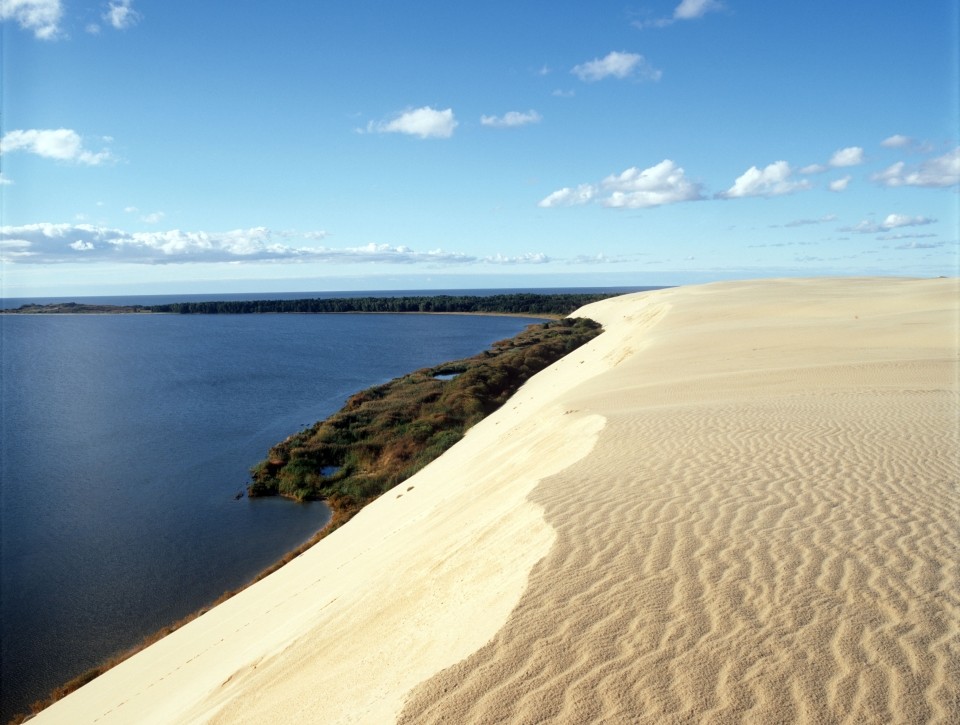
Another example is the Trakai castle, (the same as those of the Exin Castles) on an island, in the middle of a lake with the same name; by the way, the only historical national park in Europe. It's an obligatory visit at any point of the year. In Winter the lake freezes up and it's possible to walk over it! I remember now the sound of the most superficial ice cap melting in March - An auditive pleasure.
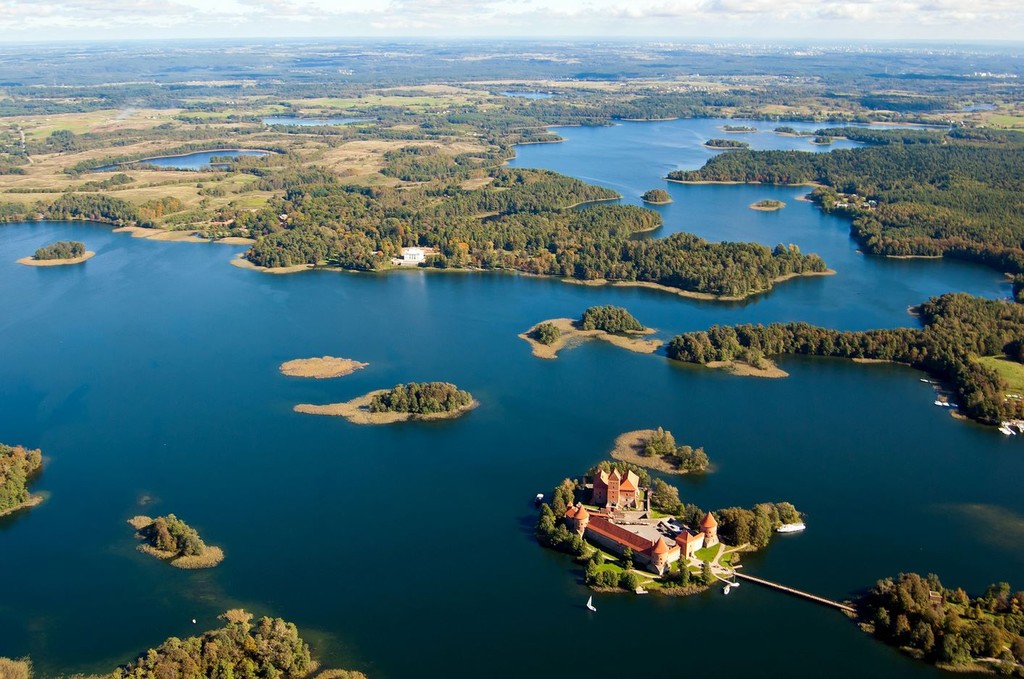
A special mention to the Hill of Crosses in Siauliai, which survived the attempts to destroy it during the communist period thanks to the locality's neighbours. 400, 000 crosses have united the friends in this sanctuary-monument.
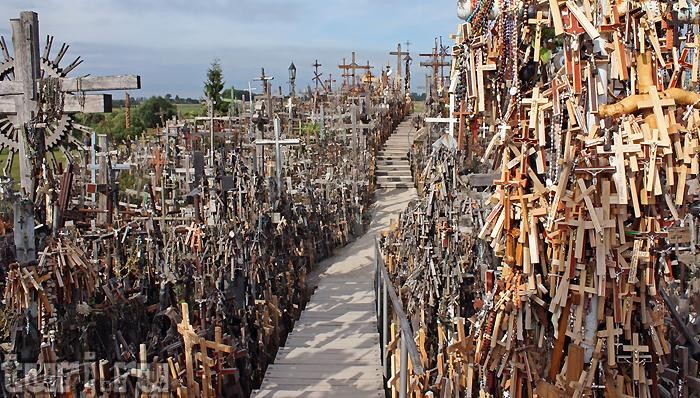
Vilnius
As an architecture student, I found the balance between a grey, Soviet and functional architecture and the neoclassical buildings, painted by the hut façades in pastel tones, very shocking. Some references which aren't to be missed in Vilnius; are The Gediminas' Tower (it's an important guy who has sculptures and streets all over the country), the colossal Cathedral Square and its curious bell tower, the Hill of Three Crosses with views over the whole city, the river Nersi which separates the historic centre from the financial part and Užupis. Užupis deserves its own chapter.
The historical centre runs through the twisted and labyrinthine streets of three story buildings, almost resembling more of a town. With the feeling of finding a church in every corner, the centre is seen quite quickly. Even in the most touristy places, the prices are affordable compared to the Spanish.
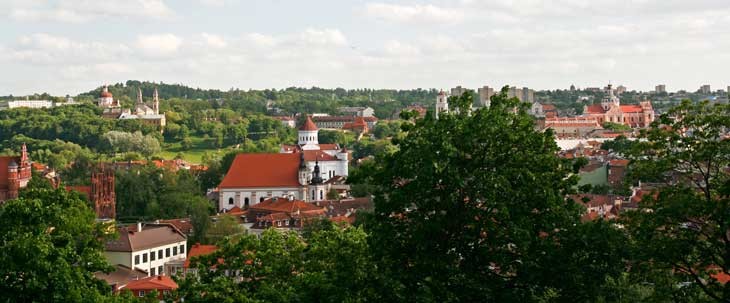

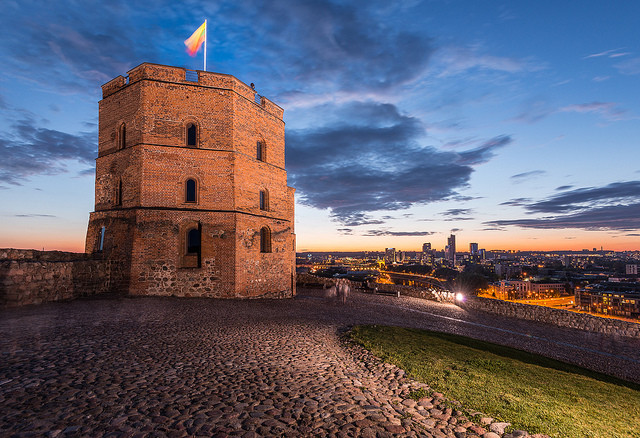
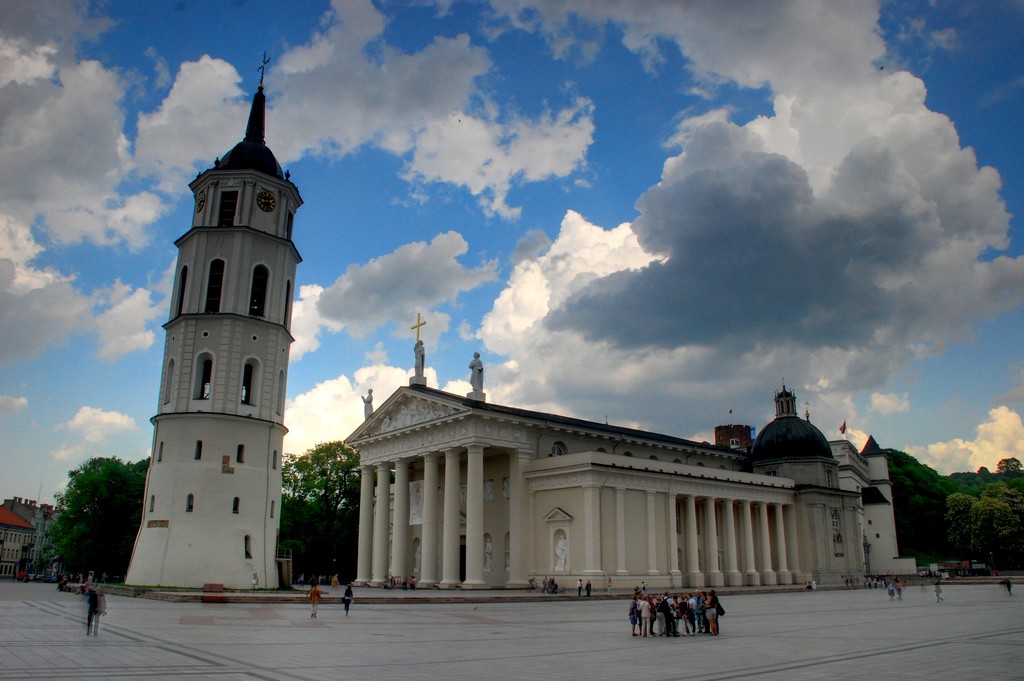
Independent Republic of Užupis
Užupis, 'the other side of the river' in Lithuanian, is a district of Vilnius, a formally marginalised zone which decided to proclaim itself as an independent republic in 1997. They did it on Holy Innocents' Day, April Fool's Day, with a 12 person army and its own constitution, presented in one of the Republic’s streets in various languages. Some of my favourite articles are:
4 - Everyone has the right to make mistakes.
13 - A cat is not obliged to love its owner, but must help in time of need.
21 - Everyone has the right to appreciate their unimportance.
34 - Everyone has the right to be misunderstood.
Nowadays Užupis is considered to be the bohemian part of the city, where a good fraction of the local artists reside.
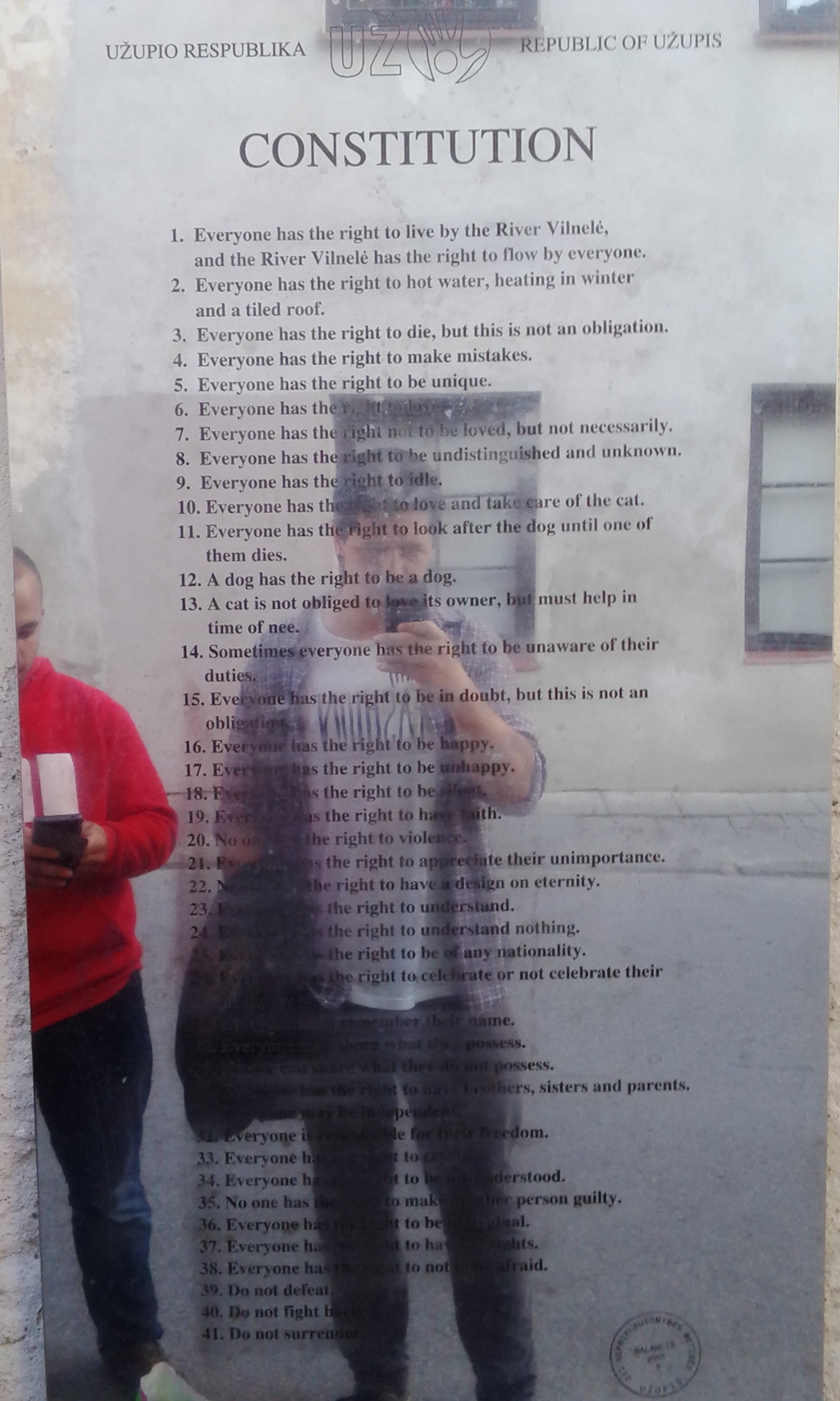
Gastronomy
In regards to the gastronomy, as in the majority of eastern Europe, the potato, the collard green and pork are the indisputable pillars of all Lithuanian food on which they pride themselves on. And rye bread. A loooooot of Rye Bread. The local food is generally loaded with calories. Some very typical things that the Lithuanians are very proud of are fried bread with cheese (they have it as an aperitif) and Zepelinai, a monstrosity of boiled potato which envelopes what pretends to be a vestige of meat (pork, normally), accompanied by poached onion or sour sauce. It tastes good but it's hard to swallow. Certainly all the Lithuanians who I have told I am not convinced, have agreed that I hadn't tried a good one, like one of their grandmother's or mother's. I imagine that it's like how the croquettes are here. '999' - Faithful companion on the Lithuanian night. It's a liquor based on 27 herbs, which, they say, inspired the creator of Jagermeister. Ah, and the cold beetroot soup is also somewhat common, although they also consider it their own in Poland.
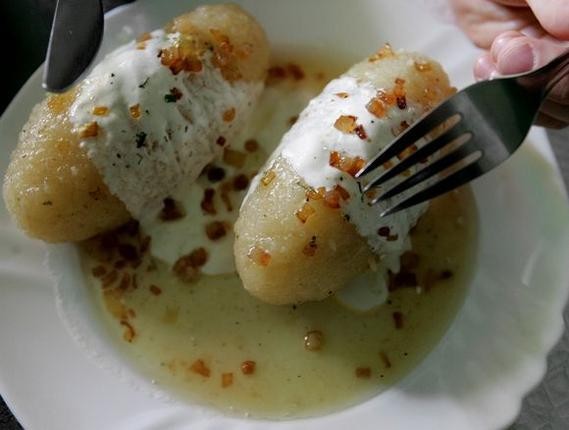
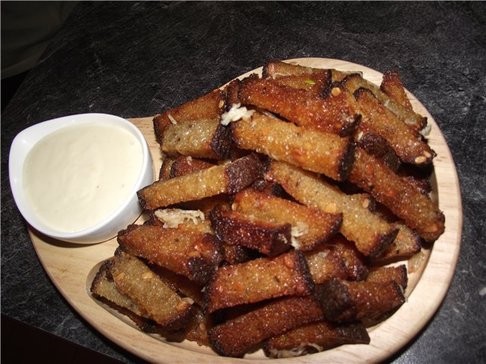
Lithuanian Culture
Speaking of Poland... The Lithuanians have a fair amount of ill feelings towards the Polish. Historically, they have disputed territories for years and even became one single territory (the great Polish-Lithuanian or Lithuanian-Polish Duchy, according to who you ask). To put it very shortly, things ended badly and Lithuania came off worse, so a lot of Polish people aren't aware of this rivalry. It's the same with the Russians. Never say to a Lithuanian, 'Ah hehe, I thought that you were a part of Russia'. Don't insinuate it either, or ask if Lithuania is like Russia. Although a good chunk of the population speak Russian, a lot of them don't like to use it. Lithuanian is in fact one of the oldest languages in Europe, more so than Latin. Its only relationship is with Latvian, and they are Baltic languages, not Slavic! Yes, it's very difficult to learn.
However, the language doesn't pose a problem. The majority of young people have a good level of English, much better than the Spanish. It's surprisingly good, if we consider that with 24 years since its independence from the USSR, Lithuania is a country born yesterday. Regarding the population, I won't deceive you. They're cold when you first come into contact with them. However like the Basques, once you break into their shell of apathetic coldness, you reach their little hearts. Something which struck my attention was a generalised positivist attitude to get ahead, to learn and to turn their backs on the Soviet past which marginalised it to the West - and they are good at this. Of course, I warn you; don't be surprised if, in being Spanish, they hope you speak like the gardener from a Venezuelan soap. Spanish-language soaps here are very popular and as a result of this a lot of Lithuanians study Spanish. On the other hand, as Winter is cold and hours of sunlight are scare (the sun sets at around 4), take advantage of the good weather with every type of outdoor activity and cultural events. In the capital at least, they push this a lot. Well, Vilnius!
Intensive Lithuanian course: To say male names and certain things in Lithuanian, it suffices to add -as at the end. For example, Barack Obama is Barackas Obamas. Ewan Mcgregor is Ewanas McGregoras. More useful words are krepsinis meaning basketball, alus meaning beer and degtine meaning vodka.
Party
As this is a website associated with Erasmus, I couldn't miss partying out of this article. It's a difficult topic because as it often happens, there are two types of parties in Vilnius - the Lithuanian one and the Erasmus one. The Erasmus party place is Salento, par excellence - a club very much orientated to intoxicated students with money. It organises themed parties and opens every day. Every day. Of course there are alternatives to the taste of the consumer: Exit, Grand Club, Posh, Pantera, Cocainn, Budha... and for those more alternative, Loftas and Opium. In these last ones, there is usually more of a Lithuanian presence. Ah, and don't drink in the street. The police are very strict about it. Although the fines are ridiculous, they will fine you if you get off the trolleybus with a beer and even if you jaywalk (3 euros).
Borders
Finally, considering that Lithuania with its 2. 9 million inhabitants is quite a small country, it should be added that travelling to the surrounding countries is easy, safe and ridiculously cheap, often with offers. Don't miss out on the opportunity to visit at least Latvia, Estonia and Poland if you're here for a sufficient amount of time - And soon! This is because tourism in the area is exponentially growing, as well are the prices and the artificiality of the same. Ah, and Finland, my first choice when choosing Erasmus destination, is a stone's throw away. I confirmed that I'm satisfied with preferring the destination that I ended up with.
I conclude here; this brief guide to making contact with this proud country, being the most Eastern of the 8 counties hosting central European that exist. All to Lithuania!
Photo gallery
Content available in other languages
Share your Erasmus Experience in Vilnius!
If you know Vilnius as native, traveler or as exchange student... share your opinion on Vilnius! Rate different characteristics and share your experience.
Add experience →



























Comments (0 comments)